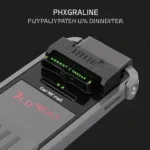OBD2 chips have gained popularity in recent years, promising increased performance and fuel efficiency for vehicles. But the question remains: do OBD2 chips actually work as advertised, or are they just another automotive gimmick? This comprehensive guide delves into the intricacies of OBD2 chip functionality, exploring their potential benefits and drawbacks to help you make an informed decision.
Understanding OBD2 Technology and Performance Chips
Before we delve into the effectiveness of OBD2 chips, it’s crucial to understand how they interact with your vehicle’s onboard diagnostics system.
What is an OBD2 Port and How Does it Work?
All modern vehicles come equipped with an OBD2 port, a standardized interface that allows mechanics and car enthusiasts to communicate with the vehicle’s computer system. Through this port, one can access a wealth of data, including engine performance, fuel consumption, emissions, and sensor readings.
The Role of OBD2 Chips
OBD2 performance chips, often marketed as “tuning chips” or “performance tuners,” are small electronic devices designed to modify the data passing through your vehicle’s OBD2 port. By altering parameters such as fuel-to-air ratio, ignition timing, and boost pressure, these chips claim to enhance engine performance and fuel economy.
Debunking the Myths: Do OBD2 Chips Really Enhance Performance?
While manufacturers often make bold claims about significant horsepower and fuel efficiency gains, the reality is far more nuanced.
The Potential for Minor Improvements
In some cases, OBD2 chips might lead to marginal improvements in performance, particularly in older vehicles with less sophisticated engine management systems. By adjusting fuel maps and ignition timing, these chips could potentially unlock a few extra horsepower or improve throttle response.
Limitations of OBD2 Chips
It’s crucial to approach performance claims with a healthy dose of skepticism. OBD2 chips primarily modify existing engine parameters within a limited range. They cannot magically overcome the physical limitations of your engine or drastically alter its design.
Quote from Expert:
“While OBD2 chips might offer slight tweaks, they can’t transform a standard engine into a high-performance powerhouse. Significant performance gains often require more comprehensive modifications, such as upgrading the intake, exhaust, or turbocharger system,” says John Miller, a seasoned automotive engineer with over 20 years of experience in engine tuning.
The Fuel Efficiency Debate
The claims of improved fuel efficiency are often exaggerated. While some users report minor improvements, these gains are often negligible and depend on various factors, including driving habits and vehicle condition.
Risks and Considerations When Using OBD2 Chips
Before investing in an OBD2 chip, it’s essential to be aware of the potential risks and drawbacks:
- Voiding Your Warranty: Installing an aftermarket performance chip could void your vehicle’s warranty, especially if the chip is deemed responsible for any engine-related issues.
- Engine Damage: In some cases, improper tuning or using a low-quality chip can negatively impact engine performance, leading to increased wear and tear or even engine damage.
- Emissions Concerns: Modifying engine parameters could affect your vehicle’s emissions, potentially causing it to fail emissions tests.
Making Informed Decisions About OBD2 Chips
While OBD2 chips might offer a glimmer of potential for minor performance enhancements, it’s crucial to temper your expectations and approach these devices with caution.
- Thorough Research is Key: Before purchasing an OBD2 chip, research reputable brands and read reviews from credible sources to avoid scams and low-quality products.
- Consider Your Vehicle’s Age and Condition: Older vehicles with simpler engine management systems might experience more noticeable changes compared to newer models with sophisticated ECU tuning.
- Professional Installation is Recommended: If you decide to proceed with an OBD2 chip, consider having it professionally installed by a qualified mechanic to minimize risks and ensure proper configuration.
Conclusion: Weighing the Pros and Cons of OBD2 Chips
In conclusion, while OBD2 chips might seem like an easy path to enhanced performance and fuel efficiency, the reality is far less straightforward. These devices might offer marginal improvements, but they come with inherent risks and limitations. Thorough research, realistic expectations, and professional installation are paramount when considering OBD2 chips for your vehicle.
Frequently Asked Questions
- Will an OBD2 chip increase my car’s horsepower?
- The impact on horsepower varies depending on the vehicle and chip. Some users report minor gains, while others experience no noticeable difference.
- Can I remove the OBD2 chip after installation?
- Yes, OBD2 chips are generally easy to install and remove. However, it’s essential to refer to the manufacturer’s instructions for proper procedures.
- Are OBD2 chips legal?
- The legality of OBD2 chips varies depending on local regulations and emissions standards. It’s crucial to check your local laws before installing any performance-enhancing devices.
- Do OBD2 chips work on all cars?
- OBD2 chips are designed to work with vehicles equipped with an OBD2 port, which became standard in most vehicles manufactured after 1996.
- What happens if I disconnect the OBD2 chip?
- Disconnecting the chip will typically revert your vehicle’s engine settings to their default parameters.
For further information on OBD2 chip functionality and their compatibility with specific vehicle models, explore our detailed articles:
- Does the Nitro OBD2 chip work?
- Super OBD2 Performance Chip 5.0: Does it work?
- Does Nitro OBD2 really work?
- OBD2 performance chips: Do they work?
- OBD2 chip work: Bronco
Need further assistance? Contact our 24/7 support team via WhatsApp: +1(641)206-8880, or Email: [email protected].
